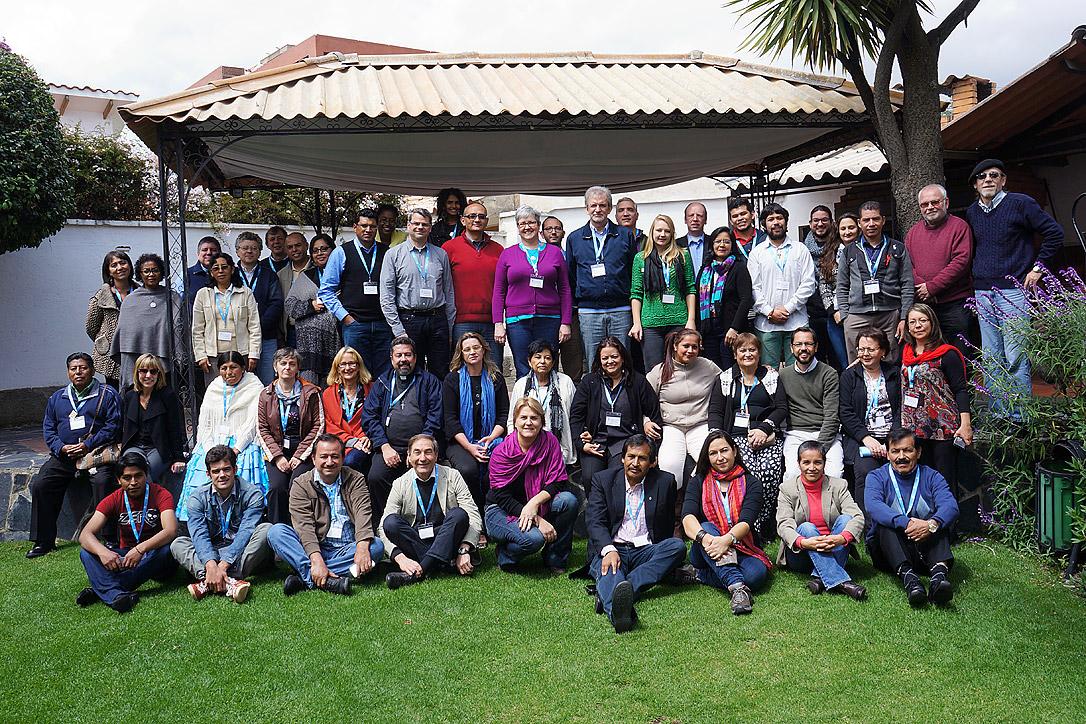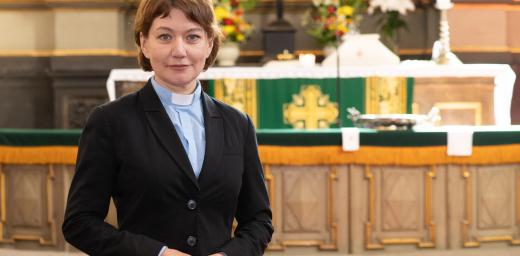Radical Forms of Inclusion Can Strengthen Diaconal Practice

Participants at the April 2015 LAC Church Leadership Conference in La Paz, Bolivia. Photo: Eugenio Albrecht
Reformation Focus at LWF Latin America and Caribbean Gathering
(LWI) – In a context marked by increasing exploitation of natural resources, forced migration and human trafficking, Lutheran churches in Latin America and the Caribbean (LAC) have called for stronger advocacy to affirm that salvation, creation and human beings “are not for sale.”
Meeting in Bolivia’s western city of La Paz, leaders of The Lutheran World Federation (LWF) member churches in LAC reflected on the LWF Twelfth Assembly theme, “Liberated by God’s Grace” and its implications for service or diakonia.
“It is clear that creation is not for sale because none of us is for sale! And, if that was not the case, I wonder at what moment we would stop looking at creation as if we were not part of it,” said Rev. Gustavo Gómez, president of the United Evangelical Lutheran Church (IELU) of Argentina and Uruguay.
The 65 delegates—heads of churches, women and youth leaders, and persons linked to networks in the region—and invited guests at the 7-10 April conference discussed how Lutheran churches in the region can strengthen the practice of diakonia to integrate radical forms of inclusion as shown by Jesus himself.
Lutheran diakonia in LAC focuses on ongoing training; making the churches’ diaconal work visible; and working in networks to sustain learning and sharing of experiences. It integrates inclusion, climate justice, human dignity and creation, all of which are linked with gender justice and youth participation.
Greater Awareness about Values
The participants who included representatives of the LWF member churches in North America said the main challenges to survival in both regions include labor and sexual exploitation, disappearance of young people, sex tourism and the sale of children. Trafficking in body organs, violence against women, forced migration and deportation were also mentioned as activities that increasingly threaten life and human dignity.
The LAC Women and Gender Justice network encouraged churches to promote the empowerment of women based on compassion, solidarity and justice. The network’s coordinator, Ms Elizabeth Arciniegas Sanchez, Evangelical Lutheran Church of Colombia, decried the injustice of human trafficking. “The value given to human beings calls for greater awareness that their dignity, their life and dreams are not for sale,” she added.
In the context of Easter, participants reflected on Christian and Lutheran faith. “I must confess that sometimes my ability to claim the free gift of God’s salvation is threatened by the culture in which I live,” said National Bishop Susan C. Johnson, Evangelical Lutheran Church in Canada. She spoke of a culture of consumerism that emphasizes economic growth, the accumulation of possessions, the search for youth and acquisition of lasting beauty, and prioritizing focus on the individual [self].
“All these false gods demand work and a large amount of money and other resources in order to obtain ‘salvation’,” added Johnson, LWF Vice-President for the North American region. “Let us renew our baptism; let us abandon the paths which lead us away from God in order to be closer to the body of Christ and to be strengthened to keep the promise of God’s salvation – a free gift!”
Representatives of the Evangelical Lutheran Church in America at the conference included LWF Council members Ms Christina Jackson-Skelton and Mr Joseph Villalon. Jackson-Skelton is chairperson of the LWF Finance Committee.
Celebrating God’s Grace
The conference discussed how to strengthen the processes of participating in the LWF pre-assemblies and the Twelfth Assembly in Windhoek (Namibia) in 2017, and how to affirm the celebration of God’s grace as a central element which is not for sale.
In preparation for the 500th anniversary of the Reformation, the region is organizing various activities in the academic field and in public and ecumenical witness.
The LAC churches welcomed the LWF “Women on the Move: From Wittenberg to Windhoek” (WMWW) three-year process, launched in early 2015 to articulate women’s contribution to the churches in the context of the 500th Reformation anniversary.
Churches are taking up the WMWW objectives. Rev. Dr Nestor P. Friedrich, president of the Evangelical Church of the Lutheran Confession in Brazil (IECLB), said the church has started collecting stories of women (‘Her-stories’). “As a church, we have deliberately forgotten the work of women although they are pioneers and the central body for passing on the faith to new generations. We already have many stories of young people, adults and older people who are a very important part of the church,” he added.
Suriname to Host 2016 Regional Pre-Assembly
The annual leadership conferences support the LWF member churches in nurturing “a more visible expression of regional Lutheran communion,” noted Rev. Dr Patricia Cuyatti, area secretary for LAC at the Department for Mission and Development.
Cuyatti said church leaders have expressed gratitude for the generous space in which churches have the possibility to establish closer ties, experience communion and collaborate across the various networks. “I have seen concrete acts of solidarity and support which are inspired by the grace of God,” she added.
The LAC leaders agreed to hold the regional LWF Pre-Assembly from 29 August to 2 September 2016 in Paramaribo, Suriname. This year’s conference was hosted by the Bolivian Evangelical Lutheran Church.
(A contribution by Argentine pastor Rev. Eugenio Albrecht, journalist in the LAC Communication Network)





